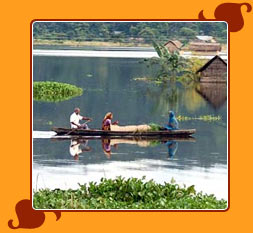Kaziranga National Park lies partly in Golaghat District
and partly in Nagaon District of Assam. It is the oldest park in assam
covers an area of 430 Sq kms along the river Brahmaputra on the North and
the Karbi Anglong hills on the South. The National Highway 37 passes through
the park area and tea estates, hemmed by table-top tea bushes. One can even
see the rhinos and wild elephants straying near the highway.

Kaziranga
National Park a world heritage site is famous for the Great Indian one
horned rhinoceros, the landscape of Kaziranga is of sheer forest, tall
elephant grass, rugged reeds, marshes & shallow pools. It has been
declared as National Park in 1974. Kaziranga National Park is one of the
last areas in eastern India undisturbed by a human presence.
It is
inhabited by the world's largest population of one-horned rhinoceroses, as
well as many mammals, including tigers, elephants, panthers and bears, and
thousands of birds. The park is open from November to April. Tourists can
take rides on elephants to move around the park or cruise in a boat on the
Brahmaputra along the park.
Wildlife in Kaziranga
National Park Amoderate climate combined with the availability of
enough food resources supports the growth and survival of a unique and
diverse wildlife in Kaziranga National Park. Apart from being a rich natural
habitat for the great Indian One-horned Rhinos, Kaziranga Wildlife Sanctuary
also has a sizable population of the Wild Buffalos and Indian Elephants.
Herds of wild elephants, some times numbering up to 200, can be seen
migrating from the Mikir hills to the bheels (marshes or ox-bow lakes),
offering the most spectacular view to the wildlife enthusiasts.
Flora
in Kaziranga National ParkThere are three main types of vegetation
in Kaziranga National Park: alluvial inundated grasslands, tropical wet
evergreen forests and tropical semi-evergreen forests. Kaziranga is the
largest floodplain grassland of its kind, still surviving in India.
Grasslands predominate in the west, with the tall grasses and reeds (also
called elephant grass) on the higher ground and the shorter grasses growing
around the waterbodies, locally known as 'beels'. Amidst the grasses are
numerous forbs and scattered trees of Bombax ceiba, Dillenia indica, Careya
arborea and Emblica officinalis. The tropical wet evergreen forests are
dominated by trees such as Aphanamixis polystachya, Talauma hodgsonii,
Dillenia indica, Garcinia tinctoria, Ficus rumphii, Cinnamomum bejoighota,
and species of Syzygium. .
Fauna in Kaziranga
National Park The fauna in Kaziranga National Park, abounds in a
large variety of mammals and wildlife other than the one-horned Indian
rhinoceros. Indian Elephants, Indian Bison, Swamp Deer or Barasingha, Hog
Deer, Sloth Bears, Tigers, Leopard Cats, Jungle Cats, Otters, Hog Badgers,
Capped Langurs, Hoolock Gibbons, Wild Boar, Jackal, Wild Buffalo, Pythons,
Monitor Lizards, etc also reside here.
How to Reach
KazirangaBy Air :- The nearest airport to Kaziranga is
situated at Guwahati, which is 217-km away from the park. The other airport
is located at Jorhat, 97-km from Kaziranga.
By Rail :- The
nearest railhead is at Furkating, situated 75-km away from Kaziranga
National Park.
By Road :- ASTC buses and private buses to
Guwahati, Tezpur and Upper Assam are available from the main gate of the
park at Kohora.






